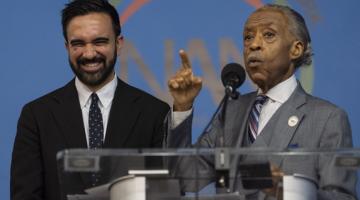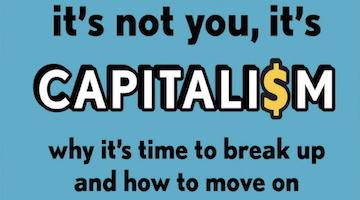V.I. Lenin and W.E.B. Du Bois: Class Struggle and Civilization
While the ruling elite is calling for a capitalist reset which could leave half the working class without jobs or adequate income, many leftists are proclaiming working class backwardness.
“If a working-class left is to emerge it must attack the idea that the US working class is irredeemably backward.”
The US left’s response to the current election and the crises that produced it, demonstrates embarrassing political and ideological emptiness. Its rush to Joe Biden and the party of obscene wealth in the name of fighting alleged fascism is disturbing and revealing. It shows that the left has abandoned the working class and gone to the side of the most predatory, wealthy and war making parts of the ruling class in the name of defeating Trump. They have fallen under the leadership (it seems quite willingly) of high finance (Wall Street) and high tech (Silicon Valley), the military industrial complex/ deep security state and the corporate media. By abandoning revolutionary ideology and the working class they made a bargain with the devil, one they will undoubtedly lose. Knowingly or not by rejecting revolutionary theory and ideology in the name of practicality (or even a supposed people’s front against fascism) they’re left subservient to the politics and ultimately the interests of the billionaire class. They are, in their current moment, completely useless to the working class and the masses. The left justifies its alignment with oligarchs and warmakers with the claim that the white working class is backward; a claim that ultimately applies to all workers. However, is the fact that the majority of white workers and growing numbers of Black and Latino workers voted for Trump evidence of backwardness; or perhaps their seeing their class interest differently than the left and “woke” elites? Or does the left need the claim of backwardness to justify their abandonment of the working class and the poor?
“By abandoning revolutionary ideology and the working class they made a bargain with the devil.”
Is it possible to bring the left back to the working class and make it a political force worthy of Black folk and the working class? Or is it too late? Is there a path to building a left worthy of this time? Furthermore, what are some of the ideological and theoretical questions that must be addressed? If it is possible to build a genuine left, it will take commitment and courage not seen for decades in the left. This is a political task which cannot be achieved without the working class, the same class that most of the current left has contempt for. Can the left which looks upon the majority of workers as backward and racist capable of change?
If a working-class left is to be built there has to be complete and thorough rejection of identity politics in its gender, sexuality preference and afrocentirc/neo-Garveyist manifestations. It means a rejection of bourgeois socialism, social imperialism, anarchism, bourgeois trade unionism and Trotskyism. Serious radicals and revolutionaries must muster the courage to stand up to loud mouthed idiots of identity politics and their professors. There must be a full-throated rejection of European centered cosmopolitan excuses for upholding liberalism and bourgeois democracy; especially as they manifest in the current crisis. It means a return to thinkers like Lenin and Du Bois. What does this mean? and why is a return to certain of their insights important?
“Serious radicals and revolutionaries must muster the courage to stand up to loud mouthed idiots of identity politics and their professors.”
Du Bois and Lenin never met. Lenin probably never heard of DuBois; Du Bois, however, knew of Lenin. Lenin was born two years after Du Bois; Du Bois outlived him by almost forty years. Yet, their thinking intersects at a critical political/theoretical moment; especially over the issue of could “backward” peoples leap to the vanguard of revolutionary struggle. For Lenin, could the “backward” Russian proletariat be the vanguard of world socialist revolution; for Du Bois could the Black proletariat lead the American working class and even build a democratic dictatorship of the Black proletariat in the US south. Lenin answered that the small, relatively undeveloped and “backward” Russian proletariat could lead a socialist revolution. His opponents were leaders of the German working class and the powerful German Social Democratic Party and their followers throughout Europe and in Russia, among them Mensheviks and Leon Trotsky; all insisting that Russia was too backward to either carry out a socialist revolution or hold on to it afterwards without socialist revolutions in western Europe. This logic is the foundation of Trotsky’s notion of permanent Revolution and Rosa Luxembourg’s anarcho-syndicalism anchored to the idea of a general strike leading to revolution. Lenin made a civilizational break with the European left and turned to Asia rather than Europe as the option for support and allies. In Du Bois’ case working class socialists like Eugene V Debs and others, who understood class and class struggle in dogmatic and narrow ways, understood neither the full scope and complexity of the class struggle, nor its relationship to an emergent people’s civilization.
“Lenin made a civilizational break with the European left and turned to Asia.”
Does the idea that the US working class is backward justify abandoning it? Or did the idea of the alleged backwardness of Black folk and the colonized justify reducing them to nonhuman peons in a global system of exploitation and abandoning them to their fate? An idea once applied to non-Europeans has come home to roost. These claims are part of an eclectic mix of views emanating from the petit bourgeois and elite academics. They arise when the US is in a crisis of capitalist rule. The crisis of rule has never been more intense; what in bourgeois political science is called a crisis of legitimacy. We are in a moment of ideological reckoning. The nation is deeply divided, and the vital center of bourgeois rule has collapsed. Political research shows that the 21st century Democratic Party is miles removed from the party of FDR or for that matter LBJ. Within it is the greatest concentration of wealth ever seen in a modern party. In this situation the US working class has been defined as backward. Racism, it is argued, is embeddedness in the white working class, so much so that it is the most racist group in society and thus incapable of fighting for its class interest. This view is so widely held that it is received as truth. In essence these claims congeal around the ideas of white working-class backwardness. While the ruling elite is calling for a capitalist reset which could leave half the working class without jobs or adequate income in a high technology driven Fourth Industrial Revolution, many leftists are proclaiming working class backwardness. Does this stance not fit the aims of elites to reengineer capitalism in a Fourth Industrial Revolution/capitalist reset?
“An idea once applied to non-Europeans has come home to roost.”
Lenin and Du Bois confronted the question of “backward” people and classes. Unquestionably the US political system and elites promote cultural and political backwardness among workers. Its rule is predicated upon it. The two-party duopoly and the marginalization of third- or working-class party efforts leaves the working class with few electoral options and in a state of political and ideological defenselessness and confusion. Most don’t vote or use their votes as protest against what they see as an illegitimate political system. Add to this the opportunism of many labor leaders who benefit from working class backwardness. Compared to many nations the US is culturally and politically undeveloped, and in a sense backward. However, does that rule out radical and revolutionary resistance? Could it be that we are confronted with questions that Du Bois in Black Reconstruction in America and Lenin in the essay ”Our Revolution” engaged?
Du Bois’ Black Reconstruction is a brilliant defense of the Black proletariat against claims that it was backward and thus a threat to civilized workers. He argued not only was slavery a form of capitalist labor, but the black worker had the capacity to be the main force fighting against it. He says 500,000 of them participated in what was a general strike by putting down their tools, refusing to work and leaving the plantations. During reconstruction he argued that a democratic dictatorship of the Black proletariat was possible in several states of the south. In many ways Du Bois’ retheorizing of class struggle in the US and the pivotal role of the Black proletariat was a powerful blow against social democratic cosmopolitans and dogmatic and sectarian Marxists.
“Du Bois argued that a democratic dictatorship of the Black proletariat was possible in several states of the south.”
Lenin under different circumstances makes a similar argument concerning the question, how could Russian workers bring about a socialist revolution and how without the European working class could they hold on to it. He says, “[B]ut what about a people that found itself in a revolutionary situation such as that created during the first imperialist war? Might it not, influenced by the hopelessness of its situation, fling itself into a struggle that would offer it at least some chance of securing conditions for the further development of civilization that were somewhat unusual.” And then asks, “why cannot we begin by first achieving the prerequisites for that definite level of culture in a revolutionary way.” Lenin’s and Du Bois’ argument is that a “backward” working class could through struggle and given a historic crisis such as world war, civil war or economic catastrophe make a qualitative leap and in so doing not only throw off the chains of oppression but create conditions for a new civilization and new human beings. This in spite of the existential terror of daily life. Du Bois makes a similar argument concerning Black workers. They were, he insisted, “everything African” and “a civilization in potentiality”; he theorized a new civilization might emerge from their struggle for freedom. Though forced into “backwardness” by oppression, they were capable of freeing themselves and creating a new civilization in the US. That remains possible.
Du Bois and Lenin argue against the gradual freeing of the “backward” people by more “advanced” and enlightened classes. The intensity and catastrophic character of a crisis can propel the “backward” to the vanguard of humanity. Both Du Bois and Lenin argue that in making revolution the “backward” start the process of making civilization. Showing that backwardness is not absolute.
“Du Bois theorized a new civilization might emerge from their struggle for freedom.”
As to the claim that the US working class is “backward”; Du Bois and Lenin would respond, the “backward” often leap forward through centuries to become the vanguard. Moreover, the class struggle can be viewed as a fight for civilization, for a new civilization; in specific moments of systemic crisis the class struggle is more than the class struggle. Upon the shoulders of “backward” people rides the future of humanity. This is what Du Bois concluded about the slaves and Black folk after slavery; it is what Lenin concluded about the future of the Russian revolution. If a working-class left is to emerge it must attack the idea that the US working class is irredeemably backward. Those who seek to build a working class left must understand, especially in this moment of crisis, that the “backward” can become the vanguard and from their ranks the leaders and theorists of a new social system and a new civilization can arise.
Anthony Monteiro is an organizer with Philadelphia’s Saturday Free School, a Du Bois scholar, a community educator, a radical and activist.
COMMENTS?
Please join the conversation on Black Agenda Report's Facebook page at http://facebook.com/blackagendareport
Or, you can comment by emailing us at comments@blackagendareport.com



















